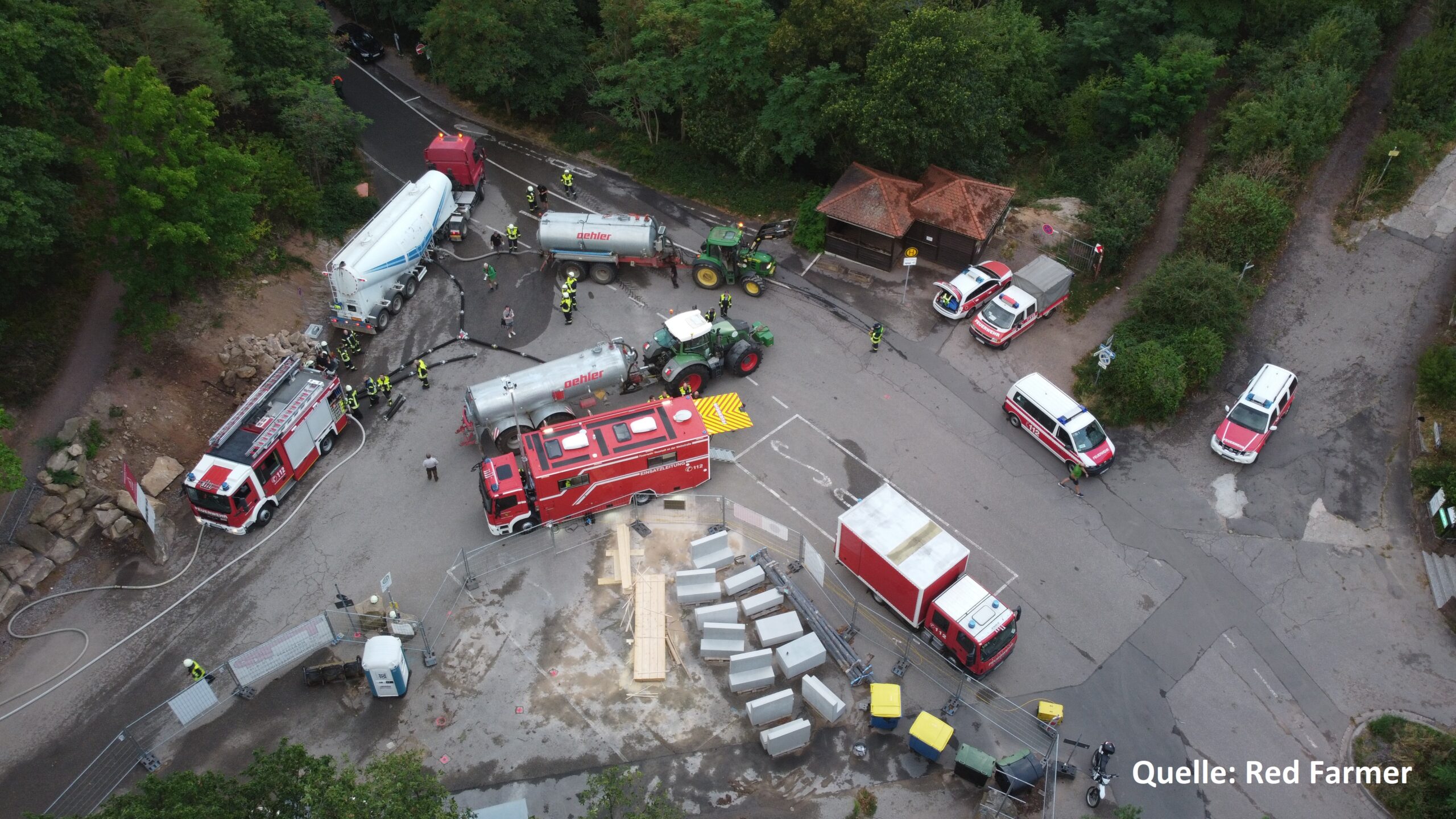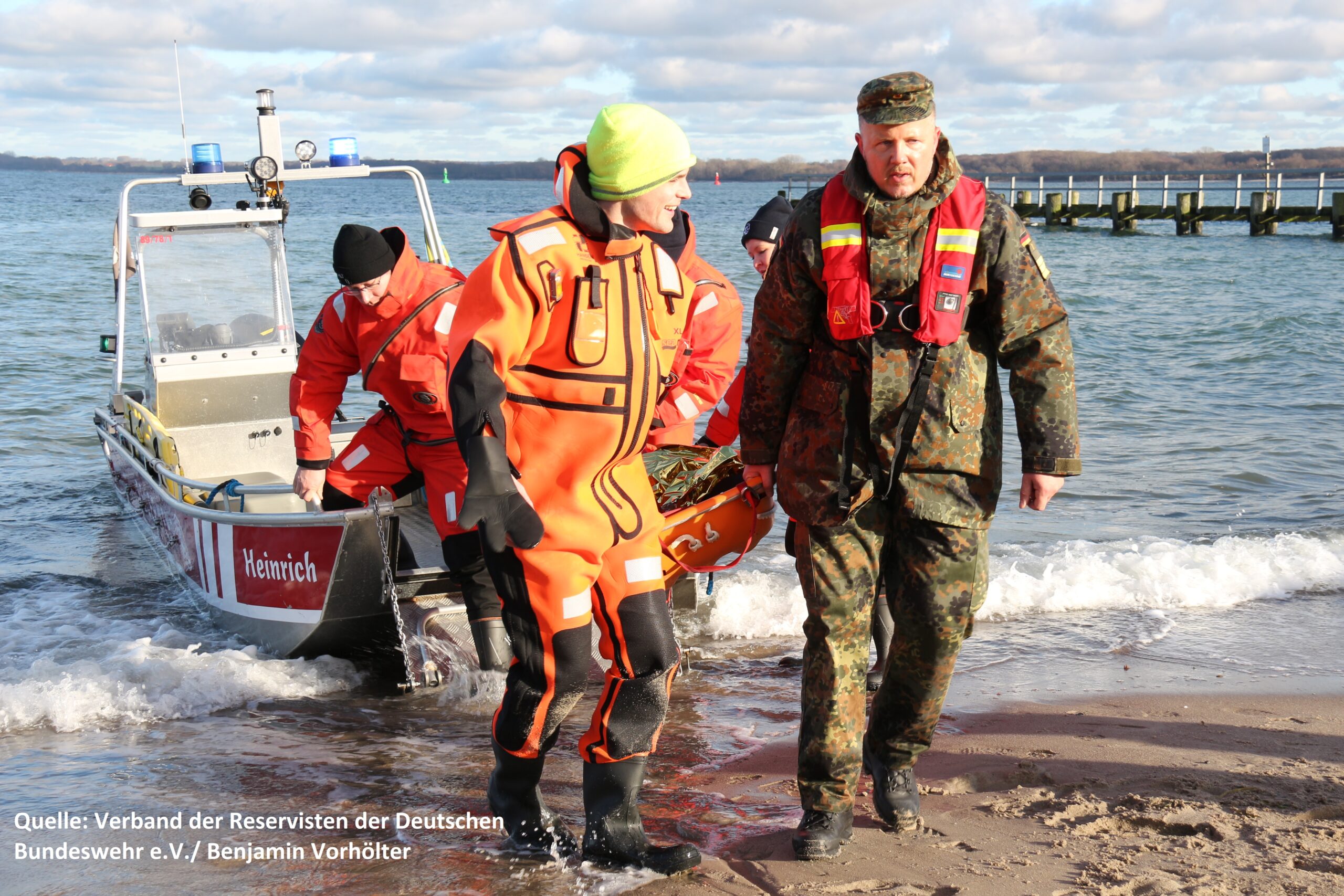30.09.2025 | Report
When the power fails, rivers burst their banks or forest fires rage, it is time for those who are ready to take action. In an emergency, everyone can help and play a part in ensuring the safety of all. In addition to volunteer organisations, associations, companies and specialist groups are also increasingly getting involved, contributing their own unique expertise to civil protection. Four exemplary projects show how cooperation across organisational boundaries can be successful and how volunteering can be strengthened in a targeted manner.
Red Farmer: fighting forest fires with heavy equipment
 When forest or wildfires break out in rural areas, every minute counts – and often every available source of water. This is exactly where the Red Farmer project comes in. What began as an idea in the district of Südliche Weinstraße in Rhineland-Palatinate is now a growing network of farmers, winegrowers and fire brigades that can provide rapid and coordinated assistance in crisis situations. Via the online platform, agricultural businesses make their machinery and equipment available for civil protection purposes – including water tanks, tractors and slurry tankers. These can be requested directly by fire brigades and control centres when needed.
When forest or wildfires break out in rural areas, every minute counts – and often every available source of water. This is exactly where the Red Farmer project comes in. What began as an idea in the district of Südliche Weinstraße in Rhineland-Palatinate is now a growing network of farmers, winegrowers and fire brigades that can provide rapid and coordinated assistance in crisis situations. Via the online platform, agricultural businesses make their machinery and equipment available for civil protection purposes – including water tanks, tractors and slurry tankers. These can be requested directly by fire brigades and control centres when needed.
The initiative brings together two groups that have long been closely linked: agriculture and the fire brigade. Many Red Farmer members are themselves involved in voluntary work or are familiar with firefighting procedures. Their technical expertise, local knowledge and willingness to lend a hand make them valuable partners in disaster control. Use of the network is voluntary, unbureaucratic and safe for all parties – because the helpers are covered by municipal accident insurance. The idea: pool existing resources, relieve the burden on volunteers and work together to strengthen the protection of the region.
More than 500 agricultural machines are now registered in the system – and the trend is upward. Following its successful launch in Rhineland-Palatinate, Red Farmer is now also active in Bavaria, supported by the respective state fire brigade and farmers’ associations. The project shows how modern technology and active solidarity can work together – and that smart solutions sometimes come directly from the field.
German Amateur Radio Club: Emergency radio for serious situations
Maintaining communication when the power fails, mobile networks are overloaded and internet connections break down requires specialist technical knowledge. This is where the German Amateur Radio Club (DARC) comes in: with its nationwide network of radio amateurs, it can quickly establish independent communication in the event of a disaster, supporting authorities, organisations and the affected population until the regular communication channels are up and running again.
The DARC has developed a nationwide emergency radio concept based on self-sufficient structures. Relay stations with emergency power supplies, portable radios and designated emergency frequencies enable a robust connection even in difficult situations. In regular exercises, local associations test for emergencies – for example, via radio rounds on frequencies such as 145.500 MHz (VHF) or 7,110 kHz (shortwave). Mobile operations centres and training in radio discipline are also part of the repertoire.
The radio amateurs of the DARC work on a voluntary basis, but bring a high level of technical expertise to the table – for example, in terms of antenna construction and interference-free transmission. Their skills are increasingly recognised by authorities, who rely on the supplementary communications network in crisis situations. The DARC is continuing to expand its emergency radio capabilities and is specifically building bridges with authorities and organisations with security tasks (BOS). The project proves that civic engagement and technical expertise are an unbeatable combination when traditional communication channels fail.
Dormagen Reservists’ Association: volunteering in flood protection
The Dormagen Reservists’ Association in North Rhine-Westphalia shows how military expertise can save lives in a civilian context.
For over 15 years, around 80 members of the association have been involved in flood and dyke protection – a task of growing importance in view of increasing extreme weather events on rivers such as the Rhine.
The reservists take on a variety of tasks: they check dykes, fill sandbags, erect mobile flood barriers and secure critical infrastructure. When needed, they support the local operations management with professionalism, good training and well-coordinated cooperation. Regular training and joint exercises with the fire brigade, the Federal Agency for Technical Relief (THW) and other disaster control actors ensure that cooperation in an emergency runs smoothly. What makes the comradeship special is the combination of military discipline and civil society engagement. Many of those involved bring combat-proven experience from the armed forces – combined with a clear commitment to voluntary local aid. This mixture makes them a reliable partner in crisis situations.
For its commitment, the Reservists’ Association 2024 was awarded third place in the ‘Support for Voluntary Work’ category of the ‘Helfende Hand’ (Helping Hand) sponsorship award. Its example stands for the successful integration of specialist knowledge into civilian civil protection, whereby it acts in a motivated, competent and locally rooted manner.
WEMAG Netz GmbH and THW: Partnership for security of supply
Extreme weather events place particularly high demands on the resilience of the electricity supply given our ubiquitous dependence on electrical energy. WEMAG Netz GmbH is a regional distribution network operator in Mecklenburg-Western Pomerania and parts of Brandenburg and Lower Saxony. Together with the eight local associations of the THW regional division in Schwerin, they have been meeting these challenges for over ten years through a close partnership that encompasses training, crisis management and technical cooperation.
The focus is on preparing for power outages: THW personnel receive targeted training on the structures and processes of energy supply, learn how to use grid technology and train for emergencies together with WEMAG employees. Conversely, the grid company benefits from the THW’s disaster control expertise, for example in the use of emergency power systems, the logistical management of major damage situations or evacuation measures.
The cooperation not only strengthens operational capacity in the event of a crisis, but also mutual understanding in everyday life. This allows planning processes to be coordinated, new technologies to be evaluated jointly and legal changes to be integrated at an early stage. Particularly in a large state such as Mecklenburg-Western Pomerania, where sparsely populated areas place special demands on network expansion, this cooperation is a valuable contribution to security of supply.
In 2024, the project was awarded fourth place in the ‘Support for Voluntary Work’ category of the ‘Helfende Hand’ sponsorship award. It is a prime example of how companies and emergency services organisations can secure a robust infrastructure through continuous partnership – and thus strengthen voluntary work in disaster control.
The four projects demonstrate how much potential there is in the interaction between aid organisations and other groups. Whether in agriculture, technology, the military or the economy – those who contribute their strengths make a valuable contribution to the resilience of our society.
Such partnerships are indispensable, especially in times of increasing natural hazards and hybrid threats. They not only make civil protection more effective, but also more diverse – and thus sustainable.